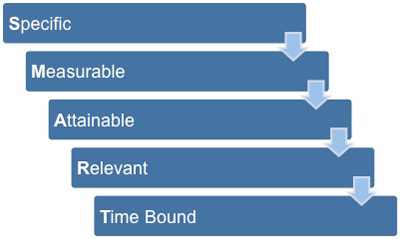Setting SMART Goals and Objectives
Your role as a manager is concerned with how a particular business function is delivered and how its performance contributes to the overall success of the organization. To achieve this you should set your team members SMART goals that provide clear objectives.
SMART goals are ones that are Specific, Measurable, Attainable, Relevant, and Time bound. Once set, the goals must then be monitored and feedback given to the individual to ensure that the goals are attained.
 |
This second principle of OSCAR performance management will ensure that both you and your staff know exactly what is required of them. This means you need to ask exacting questions to tease out the precise requirements:
- What do I want the individual to accomplish?
- Why is this task necessary and how does it contribute to the team's success?
- Who is involved in its attainment and what control do I have over this?
- Where will this task actually be delivered?
- Which items or resources are needed to attain the goal and am I aware of any constraints?
The second characteristic of SMART goals, 'Measurable,' is extremely important for your appraisal process because you need valid and objective data to show how well a person has performed. If you can't measure how well someone is progressing, how can you comment on their performance?
You should ensure that these measurements are regularly reported on and openly acknowledged by both the individual and you as their manager. Through this openness, everyone involved is made aware of whether or not the performance meets expectations.
This ongoing measurement also clearly illustrates how attainable the goal is proving to be for the individual. There is little point in setting a goal that is either too difficult to achieve or beyond a person's capabilities, as this will only serve to de-motivate them and destroy their self-confidence.
Also, the goal must be relevant to the function of the person, team, and department in how they contribute to the organization's overall success. This means that when you set the overall team objectives you need to cascade these down to individual team members according to their role and responsibilities.
To learn more about setting goals for your team please see our eBook 'Effective Goal Setting' which can be downloaded from this website.
You may also be interested in:
Performance Management Cycle | OSCAR Principles of Performance Management | Matching Competencies to Roles | Performance Appraisal Role Description | Appraisal Process Steps | Stages of the Appraisal Process.
|
|
 |


